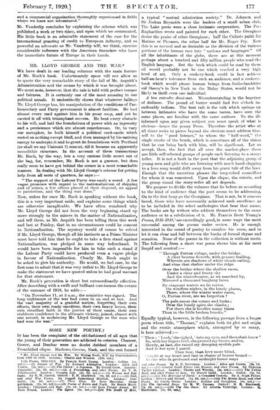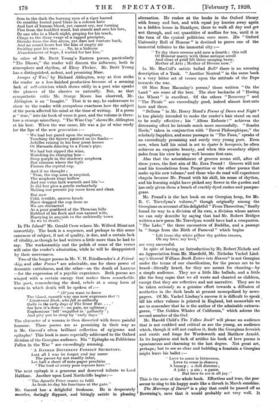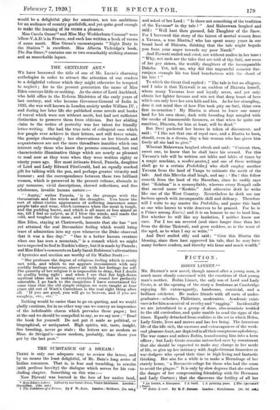SOME NEW POETRY4
IT has been the complaint of the old-fashioned of all ages that the young of their generation are addicted to coteries. Chaucer, Gower, and Dunbar were no doubt dubbed members of a Frenchified clique. Marlowe, Greene, Nash, and the rest formed • Mr. Voyd George and the War. By Walter Rock M.P. for Pembrokeshire from 1908 to 1918. London : Chatto and Winders. 116s. net.] t (1) Poems. 1916-1918. By Francis Brett Young. London : Collins. [5s. net.]-(2) Images of War. By Richard Aldington. London : Allen and Unwin. [3s. net.]-(3) The Island : a Ssquaics By Gerald Crow. London : Constable. [2s. 6d. net.]-(4) A PrieVUMNA and other Poems. By V. H. Friedlitender. London : Country Life. [Bs. 6d. net.]-(5) Worms and Epi- taphs. By H. W. Garrod. : B. H. Blackwell. [3s. 8d, net.]-(6) Bull. and other War Verses. By Donald Sutherland Mad:loll. London: Con- stable. [3s. 6d: net.] (7) Three Days. By Rose Macaulay. Same publishers. [2s. 6d. net-1-(8) Poems of Dawn and Night. By Henry Mond. London Chapman and Hall. [3s. lid. net.]-(9) Quia Pauper Arnold. By Ezra Pound. London : The Braid. [8s. net.]-(10) The Death of Man.
a typical " mutual admiration society." Dr. Johnson and Sir Joshua Reynolds were the leaders of a small urban club.
The Lake poets were a close intimate corporation. The Pre- Raphaelites wrote and painted for each other. The Georgians desire the praise of other Georgians ; half the Cubists paint for
Matisse or Picceese, the other half for Mr. Roger Fry. Now this is as natural and as desirable as the division of the various portions of the human race into " nations and languages." Of all the inhabitants of the globe, there are at this moment
perhaps about a hundred and fifty million people who read the English language. But the book which could be read by them all would probably not be one which reached a very high level of art. Only a cookery-book could in fact achieve half-an-hour's tolerance from such an audience, and a cookery-
book which would please human beings from Sutherlandshire reid Sherry's in New York to the Malay States, would not be hliely to thrill even one individual.
A ban entendre demi-mot. Misunderstanding is the begetter of dullness. The pound of butter would find five o'clock in- sufferably tedious. The best talk is the talk which springs up between intimates who have the same tastes, have seen the same places, are familiar with the same authors. To the ill- informed upon any given subject you must speak of what is obvious-hence the penny Press. Therefore the artist who at all times seeks to pierce beyond the obvious must address hbn- self to the " good listener," to whom the " half-word," the single stroke of the brush, which is sometimes all of the vision that he can bring back with him, will be significant. Let us accept, then, the fact that all over the market-place there are little self-selected groups of people each listening to a story-
teller. It is not a fault in the poet that the adjoining group of young men and girls who are listening with much hand-clapping to a love song would drift away from his grave tale of the laws Enough that the narration pleases the long-robed councillors for whom it was conceived. Upon the clique, the coterie, and the group round the story-teller all art depends.
We propose to divide the volumes that lie before us according to the kind of audience that the poet seems to be addressing.
On to the first heap go the Georgians. That is not, be it remem- bered, those who have necessarily achieved such excellence as to be included in the select anthologies that bear that name. The books are by writers who address themselves to the same audience or to a subdivision of it. Mr. Francis Brett Young's
Poems,1916-1918,'weexceedingly good, in some ways the most successful among the poems under review. He is enough
interested in the sound of poetry to canalize his verse, and to let it run clear and full between the banks of formal rhyme and scansion. None of the poems in the collection is without merit. The following from a short war poem shows him at his most limpid and musical :- " Through Porton village, under the bridge. A clear bourne floweth, with grasses trailing, Wherein are shadows of white clouds sailing, And elms that shelter under the ridge.
Over the bridge where the shallow races, Under a clear and frosty sky And the winterbourne, as we marched by, Mirrored a thousand laughing faces.
By stagnant waters we lie rotten.
On windless nights, in the lonely places,
There, where the winter water races, 0, Porton river, are we forgotten
The pale moon she comes and looks ; Over the lonely spire she climbs ; For there she is lovelier many times Than in the little broken brooks."
Equally typical, however, is the following passage from a longer poem whose title, " Thamar," explains both its plot and origin and the exotic atmosphere which, attempted by so many, is here achieved :-
" Then : Look,' she sighed, into my eyes. and thou shalt know ' So, with her fingers frail, she pressed my brows, and so, Slowly, at last, she raised my drooping eyelids pale And in her eyes I gazed.
Then fear, than love more blind, 'aught at my heart and fast in chains of horror bound- .1.. one who in profound and midnight forest ways
and other Poems. By R. C. Trevelyan. London : Allen and Unertn. [In. 6d. net.]-(11) General Booth Enters into Heaven, and other Poems. By Biehdaa Vachel Lindsay. London : Chatto and Winders. [be. net.]-(12) The Yellow Rock, and other Poems of Love. By Harold Child. London : Nisbet. [2a. 6d. net.]-(13) The Marriage of Itario : a Coweiteet Comedy. By A. Hugh Fisher. London : Selwyn and Blount. [la. licl. net.]-(14) The Moan Road. and other Poems. By Carole Oman. London : Hodder and Stoughton. [6s. natl.--(15) The Splendid Days. By M. W. Canuan. Oxford : B. U. Btackwoll.
[3a. 6d. net.1-(18) 2'he Sea Gazer. By Alberta Vickridge. London : H. Macdonald. [3s. ed. mt.]
Sees in the dark the burmng eyes of a tiger barred Or stealthy footed pard blaze m a solemn hate And lust of human blood, yet cannot cry, nor turning Flee from the huddled wood, but stands and sees his fate, Or one who in a black night, groping for his track, Clings to the dizzy verge of a ragged precipice, Shrinks from the dim abyss, yet dare not venture back, And no sound hears but the hiss of empty air Swirling past his ears. . . . So, M a hideous Abandonment of hope, I waited for her kiss."
In other of Mr. Brett Young's Eastern poems, particularly "The Dhows," the reader will discern the influence, both in atmosphere and rhythm, of Elroy Flecker. Mr. Brett Young has a distinguished, ardent, and promising Muse.
Images of War,2 by Richard Aldington, may at first strike
the reader as a less finished production because of a seeming lack of self-criticism which shows oddly in a poet who speaks the phrases of the classics so naturally. But, as that sympathetic critic Mr. Stine Moore has observed, Mr. Aldington is an " Imagist." That is to say, he endeavours to show to the reader with scrupulous exactness how the subject of the poem affected his mind at the time of writing. If a poem is true," into his book of verse it goes, and the volume is there- fore a strange miscellany. "The Wine Cup" shows Mr. Aldington at his best. When the war came, life was a jar of wine ready for the lips of the new generation :— " We had but gazed upon the amphora, Touching the figures painted on its flanks— Achilles reining in his four great horses Or Maenads dancing to a Faun's pipe.
We had but sipped the wine, Watching its changing hue—
Deep purple in the shadowy amphora But crimson where the light Pierces the crystal cup.
And if we thought : True, the cup soon is emptied, The amphora rings hollow And our veins lack warmth and life '- It did but give a gentle melancholy Making our present joy more keen and clear.
But now Cold, terrible, unseen hands Have dragged the cup from us We are distracted As a poor goatherd of the Thracian hills Robbed of his flock and sun-tanned wife, Hurrying in anguish to the unfriendly town As we to death."
In The Island3 Mr. Gerald Crow echoes Mr. Wilfred Blunt not unworthily. The book is a sequence, and perhaps to this some sameness of subject, if not of quality, is due, and a certain lack
of vitality, as though he had written a little more than he had to say. Tho workmanship and the polish of some of the verses will raise the reader's admiration, while he will be disappointed by their unevenness.
Two of the longer poems in Mr. V. H. Friedlaender's A Friend. ship, and other Poems' are admirable, one for sheer power of dramatic cattishness, and the other—on the death of Lazarus for the expression of a psychic experience. Both poems are winged with a certain energy that makes them remarkable. The poet, remembering the dead, rebels at a smug form of words in which death will be spoken of :-
" (D'you want to know The bland, smooth way one now expresses that ?) ' Lieutenant Dash, who fell so gallantly Quite in the early days of The Great War. . . . ' See how it's done 1—no pain, no ugliness ; Euphonious fell ' engulfed in gallantly ' ; And pity put to sleep by early days.' "
The character of a woman is then dissected with fierce painful humour. These poems are as promising in their way as is Mr. Garrod's often brilliant collection of ep'grams and epitaphs.' This book is more especially addressed to the Oxford division of the Georgian audience. His " Epitaphs on Politicians Fallen in the War " are exceedingly amusing.
" A RATHER DIFFERENT FOREIGN SECRETARY.
Lest all I was be forgot and my name
The passer-by not readily infer, Let half a sheet of note-paper proclaim The lord of every pose reposes here.' " The next epitaph is a generous and deserved tribute to Lord Haldane. Another upon Lord Northcliffe begins :—
• The Apostle Peter ceases to fulfil As froth to-day his functions at the gate."
Mr. Garrod has; a delightful freshness. He is desperately macabre, daringly flippant, and bitingly satiric in pleasing alternation. He rushes at the books in the Oxford library with frenzy and lust, and with equal joy hurries away again to a hidden house in Strathyre, there to walk all day and get wet through, and eat quantities of muffins for tea, until it is the turn of the cynical politician once more. His " Oxford University Roll of Honour " is destined to prove one of the immortal tributes to the immortal city :— " To thy three crowns add now a fourth ; this roll Of Honour marry with thine antique scroll And clear of grief lift thine unaging brow, Mother of Arts ; Mother of Heroes now."
In Mr. MacColl's satiric ballad Bull' there is an amusing description of a Tank. " Another Neutral " in the same book is a very bitter set of verses upon the attitude of the Pope towards the war.
Of Miss Rose Macaulay's poems; those written " On the Land " are some of the best. The slow backache of " Hoeing the Wheat " is excellent. Of the others " Recovery " and " The Picnic " are- exceedingly good, indeed almost first-rate here and there.
" Bellona in Mr. Henry Mond's Poems of Dawn and Night 8 is too plainly intended to make the reader's hair stand on end to be really effective ; his " Allons Enfants ! " achieves the distressing effect he intends much more successfully. " Scarlet Heels," taken in conjunction with "Envoi Philosophique," the scholarly Sapphics, and some passages in "The Faun," speaks of an exceedingly promising and surely very young poet. Even now, when half his mind is set to dpater is bourgeois, he often achieves an exquisite beauty, and when this secondary object fades from his view he may well become first-rate.
Alas that the astonishment of grocers seems still, after all these years, the first aim of Mr. Ezra Pound ! Grocers will not read his translations from Propertius or the other poems that make up his new volume,' and those who do read will experience chagrin because Mr. Pound with his skill, his sense of rhythm, and his learning might have picked any flower in the garden and has only given them a bunch of crackly dyed rushes and pampas- grass.
Mr. Pound's is the last book on our Georgian heap, for Mr. R. C. Trevelyan's volume," though originally among the Georgians on account of his delightful " From Theocritus," finally found its way to a division of its own, a division whose nature we can only describe by saying that had Mr. Robert Bridges written a new poem Mr. Trevelyan would have had a companion.
The Lake," the three encounters of Buddha, and a passage in " Songs from the Birth of Parseval " which begins Lift from thy white pillow thy golden tresses, Oh my love, my love," are very successful.
In spite of having an Introduction by Mr. Robert Nichols and an Appreciation from Mr. Masefield, Mr. Nicholas Vachel Lind- say's General William Booth Enters into Heaven" is not Georgian under the terms of our classification, for the poems are to be heard—literally heard, for they are meant for chanting—by a simple audience. They are a little like ballads, and a little like the long sagas that we all wrote and chanted as children, except that they are reflective and not narrative. They are to be taken seriously as a genuine effort towards a diffusion of aesthetics in the dark lands at present monopolized by news- papers. Of Mr. Vachel Lindsay's success it is difficult to speak till his other volume is printed in England, but meanwhile we are to remember that he is the author of the admirable extrava- ganza, " The Golden Whales of California," which adorns the second number of the Owl.
Mr. Harold Child's The Yellow Rockl= will please an audience that is not crabbed and critical as are the young, an audience which, though it will not confess it, finds the Georgians feverish and exotic and longs for Wordsworth and Matthew Arnold. In its happiness and lack of artifice his book of love poems is spontaneous and charming to the last degree. Not great art, perhaps; but to see so clear and bubbling a fountain a Georgian might leave his ballet :- "Love to some is bitterness. Love to some is shame; A lunacy ; a dull distress ; A joke ; a sin ; a game. But love to me is all joy."
This is the note of the whole book. Effortless and true, the poet seems to sing to his happy mate like a thrush in March sunshine. The Marriage of Bario13 is a play that could be passed off as Browning's, save that it would probably act very well. It would be a delightful play for amateurs, not too ambitious for an audience of country gentlefolk, and yet quite good enough to make the learning of its verses a pleasure.
Miss Carole Oman" and Miss May Wedderburn Caimants were fellow-V.A.D.'s in France, and each has written a book of verses of some merit. Miss Oman's onomatopoeic " Night Duty in the Station " is excellent. Miss Alberta Vickridge's book, The Sea Gazer,16 contains one or two remarkably striking stanzas and as remarkable lapses.








































 Previous page
Previous page